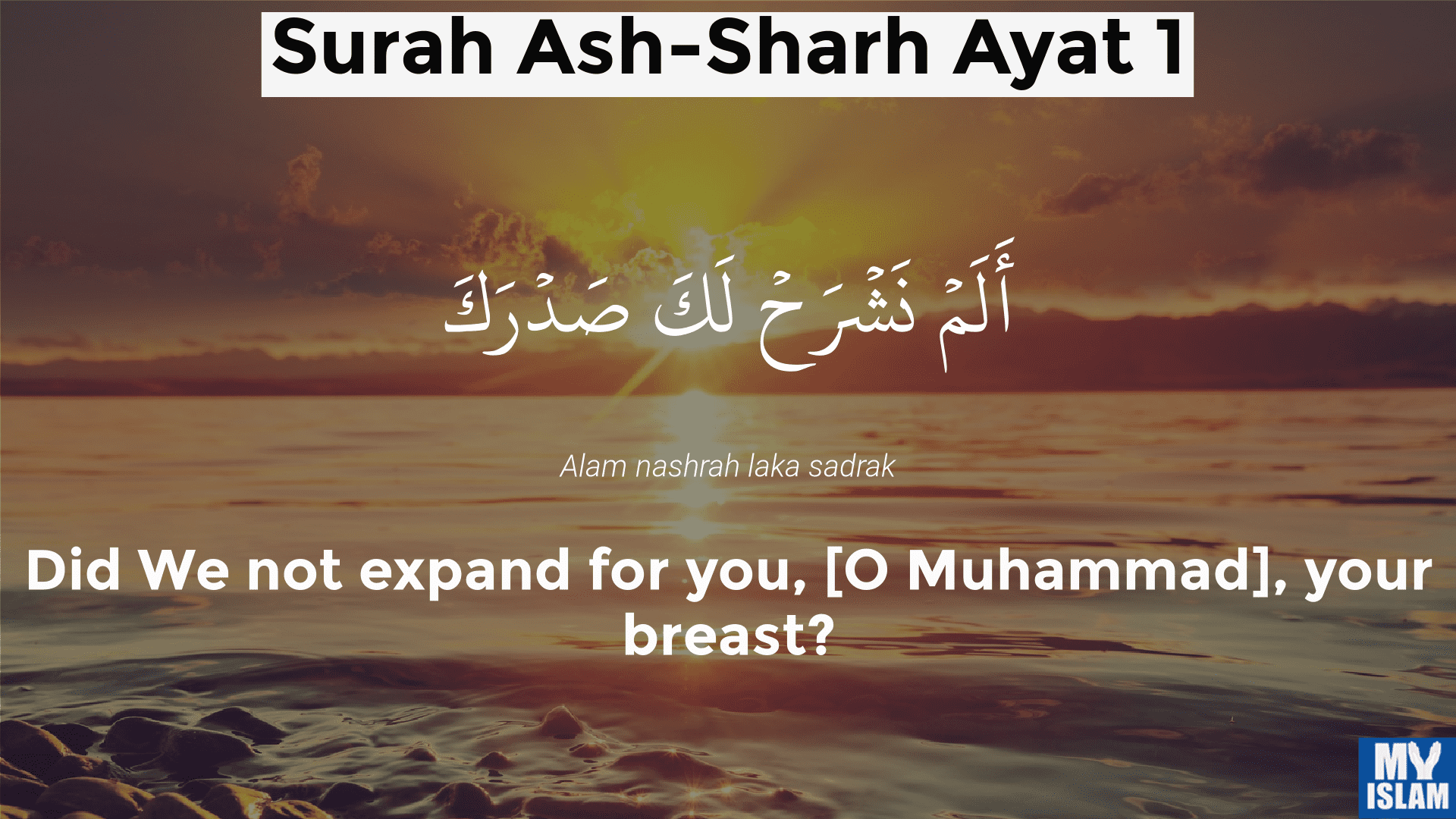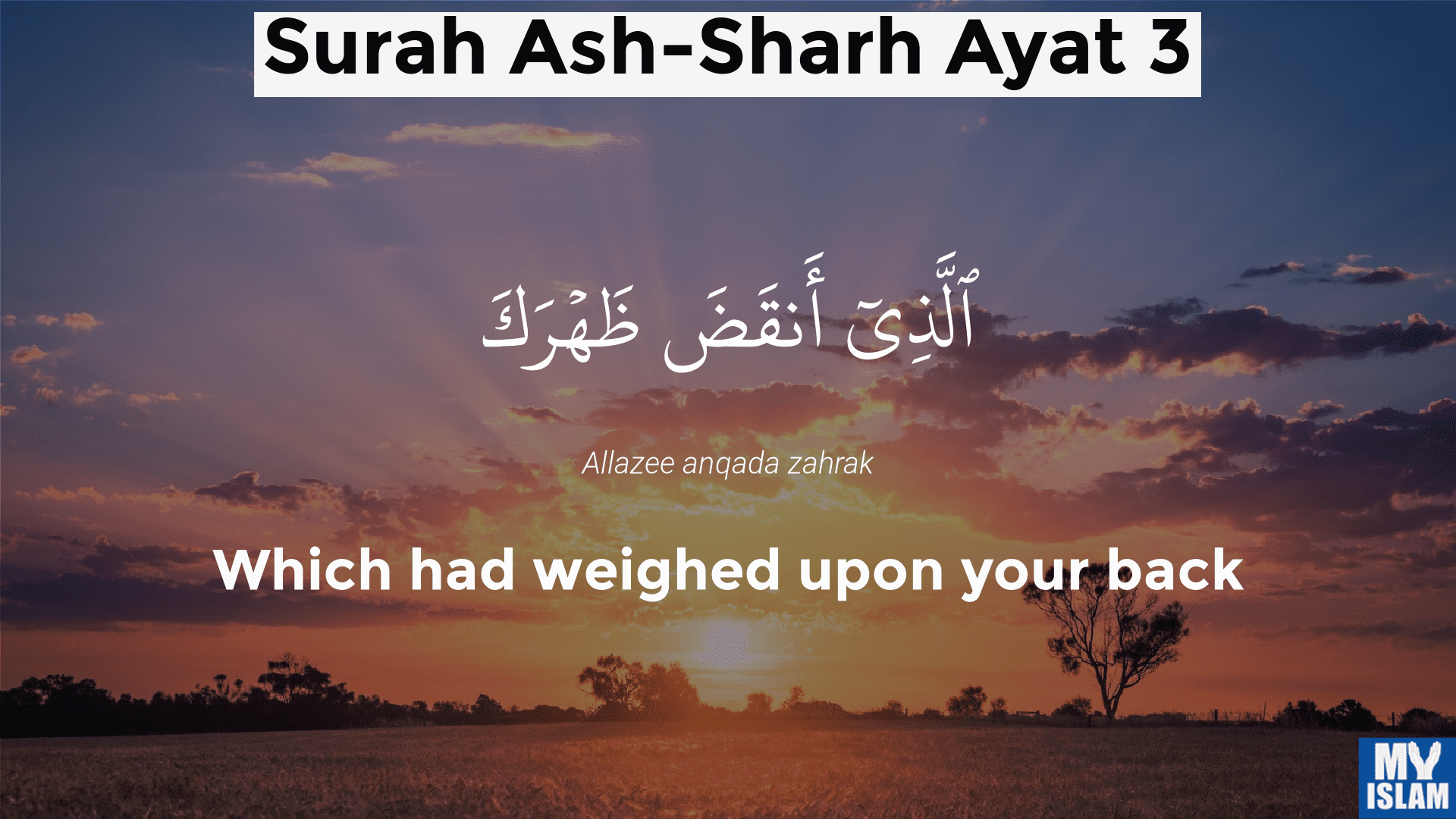Surah Ash-Sharh Ayat 1 in Arabic Text
English Translation
Here you can read various translations of verse 1
Did We not expand for you, [O Muhammad], your breast?
Have We not expanded thee thy breast?-
(O Prophet), Did We not lay open your breast
Have We not opened your breast for you (O Muhammad (Peace be upon him))?
Have We not caused thy bosom to dilate,
Have We not expanded your breast for you,
Did We not relieve your heart for you [Prophet],
کیا ہم نے تیرا سینہ نہیں کھول دیا
Quran 94 Verse 1 Explanation
For those looking for commentary to help with the understanding of Surah Ash-Sharh ayat 1, we’ve provided two Tafseer works below. The first is the tafseer of Abul Ala Maududi, the second is of Ibn Kathir.
Ala-Maududi
(94:1) (O Prophet), Did We not lay open your breast[1]
1. To begin the discourse with this question, and then the subsequent theme, shows that the Messenger (peace be upon him) at that time was very disturbed and distressed at the great hardships that he was passing through in the initial stage of his mission of calling the people to Islam. Under those conditions Allah addressed him and consoling him, said: O Prophet, have We not blessed you with such and such favor. Then, why do you feel so disturbed and distressed at these initial difficulties.
A little consideration of the context wherever the word sharh-sadr (opening up of the breast) has occurred in the Quran, shows that it has two meanings:
(1) In (Surah Al-Anaam, Ayat 125), it was said: So whomever Allah wills to guide aright, He makes his breast wide open to Islam (yashrah sadrahu lil-lslam); and in (Surah Az- Zumar, Ayat 22): Can the person whose breast Allah has opened for Islam (sharahullahu sadrahu lil-Islam) and he is walking in the light shown by his Lord. At both these places sharh-sadr implies to free oneself from every kind of distraction and vacillation and to be satisfied with Islam as the only right way of life, and to regard the beliefs, principles of morality and civilization, religious instructions and injunctions, which Islam has given to man, as right and true.
(2) In (Surah Ash-Shuara, Ayat 12-13), it has been mentioned that when Allah appointed the Prophet Moses (peace be upon him) to the great office of Prophethood and commanded him to go and confront the Pharaoh and his mighty empire, he submitted: My Lord, I fear that they will treat me as a liar, and my breast straitens. And in (Surah TaHa, Ayat 25-26), it has been stated that on this very occasion the Prophet Moses (peace be upon him) implored Allah, saying: Lord, open up my breast for me (Rabbishrahli sadri) and make my task easy for me. Here, straitening of the breast implies a person’s finding it too hard for himself to shoulder the onerous responsibilities of Prophethood and going out to clash with a mighty and tyrannical power of disbelief all by himself, and sharh-sadr implies that his morale be boosted so that he is ready to undertake any campaign and any task however difficult and hard, without any hesitation, and he develops the nerve and courage to shoulder the great responsibilities of Prophethood.
A little consideration will show that in this verse, “opening up of the Prophet’s (peace be upon him) breast”, contains both these meanings. According to the first meaning, it implied that before the Prophethood the Prophet (peace be upon him) looked upon the religion of the polytheistic Arabs, Christians, Jews and fire worshippers as false, and was not even satisfied with the hanifiyyat prevalent among some of the Arab monotheists, for it was an ambiguous creed which contained no detail of the right way. This we have explained in E.Ns of Surah As-Sajdah. But since he himself did not know what the right way was, he was mentally confused and distracted. With the blessing of Prophethood, Allah removed his mental agitation and opened up before him the way of right guidance, which brought him full peace of mind. According to the second meaning, it implies that along with the blessing of Prophethood Allah also blessed him with the courage, spirit of resolution and broad mindedness which were needed for shouldering the onerous responsibilities of the great office. He became bearer of the vast knowledge, which no other human mind could encompass and contain. He was blessed with the wisdom which could rectify any evil however grave and wide spread. He developed the capability to stand up without any equipment and the apparent help and support of a worldly power as the standard-bearer of Islam in a society sunk in ignorance and barbarism, to brave any storm of hostility without the least hesitation, to endure patiently all the difficulties and hardships of the way so that no power might cause him to abandon his position and standpoint. Thus, The verse means to impress the point: When Allah has blessed you, O Prophet, with this invaluable wealth of sharh-sadr, why do you feel distressed and depressed at the hardships you are experiencing in the initial stage of your mission.
Some commentators have taken sharh-sadr to mean shaqq- Sadr (splitting up of the breast) and have declared this verse to be a proof of the miracle of sharh-sadr as related in the traditions of the Hadith. But the fact is that the proof of that miracle is dependent only on the traditions of the Hadith, it is not correct to prove it from the Quran. According to the Arabic language, sharh-sadr can in no way be taken to mean shaqq-sadr. Allama Alusi in the Ruh al- Maani says: In the sight of the research scholars it is a weak thing to regard sharh-sadr as shaqq-sadr.
Ibn-Kathir
1. Have We not opened your breast for you 2. And removed from you your burden. 3. Which weighed down your back 4. And have We not raised high your fame 5. Verily, along with every hardship is relief, 6. Verily, along with every hardship is relief. 7. So when you have finished, devote yourself to Allah’s worship. 8. And to your Lord turn intentions and hopes.
Allah says,
(Have We not opened your breast for you) meaning, `have We not opened your chest for you.’ This means, `We illuminated it, and We made it spacious, vast and wide.’ This is as Allah says,
(And whomsoever Allah wills to guide, He opens his breast to Islam.) (6:125) And just as Allah expanded his chest, He also made His Law vast, wide, accommodating and easy, containing no difficulty, hardship or burden.
(And removed from you your burden.) This means
(That Allah may forgive you your sins of the past and the future.) (48:2)
(Which weighed down your back) Al-Inqad means the sound. And more than one of the Salaf has said concerning Allah’s saying,
(Which weighed down your back) meaning, `its burden weighed heavy upon you.’
(And have We not raised high your fame?) Mujahid said, “I (Allah) am not remembered except that you are remembered with Me: I bear witness that there is no God worthy of worship except Allah, and that Muhammad is the Messenger of Allah.”
Qatadah said , “Allah raised his fame in this life and in the Hereafter. There is no one who gives a sermon, declares the Testimony of Faith (Shahadah), or prays a prayer (Salah) except that he proclaims it: I bear witness that there is no God worthy of worship except Allah, and that Muhammad is the Messenger of Allah.
(Verily along with every hardship is relief. Veriliy along with every hardship is relief)
Allah informs that with difficulty there is ease, and then He reaffirms this information (by repeating it)
( So when you have finished, devote yourself to Allah’s worship. And to your Lord turn intentions and hopes. )
Meaning, ‘when you have completed your worldly affairs and its tasks, and you have broken away from its routine, then get up to perform the worship, and stand for it with zeal, complete devotion and purify your intention and desire for your lord.’ Similar to this is the Prophet’s statement in a hadith that is agreed-upon to be authentic,
There is no prayer when the food is served, nor when the two foul things (excrement and urine) are pressing a person.
The Prophet (صلى الله عليه و سلم) also said,
When the prayer has started and the dinner has been served, then begin with dinner.
Mujahid said concerning this Ayah, “When you are free from the worldly affairs, and you have stood to pray, then stand up for your Lord.”
Quick navigation links






